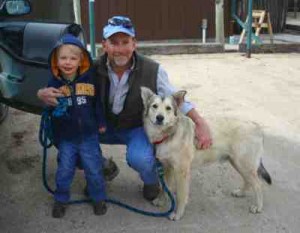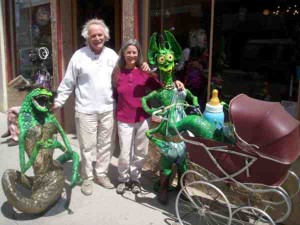Essay by Steven Albert
Western Heritage – June 2008 – Colorado Central Magazine
WHEN I WAS YOUNGER, I was sure I’d been born into the wrong century. Everything I read about America in the 1800s made me wish I’d lived along that expanding Western frontier where people lived adventurous lives. My life seemed stale and predictable in comparison, with all the excitement sapped out of the West, buried under shopping centers and Interstates. As I traveled, I used my dog-eared copy of The Journals of Lewis and Clark as part road atlas, part travelogue of that earlier West.
I’d squint at the passing scene, dissolving the mini-malls and subdivisions. I obliterated Phoenix and pictured a vast plain of saguaros. I wiped Denver off the map and envisioned a people-less Front Range. It was not only the geography, but the ideals of America in the mid-19th century that fascinated me, especially as I read the extravagantly enthusiastic essays of Thoreau, Emerson, Whitman, and Twain. They knew they were heralding something fresh.
Recently, I’ve begun to question that rose-tinted view. It’s true that if you were white and male — being rich didn’t hurt either — it was a great time to be alive with the call of Manifest Destiny ringing down the canyons. But what if you were female, black or Native American? Or you were disenfranchised, a slave, or the target of a genocidal campaign?
After York, a slave who had confronted every danger endured by the Corps of Discovery, begged William Clark for his freedom. Clark refused.
Have you ever heard of Margaret Fuller, Margaret Wood Emerson, or Elizabeth Palmer Peabody? They were the Transcendentalist women, writers as gifted as their male counterparts, but confined by roles that would never recognize their genius.
Life expectancy at the time was about 36. Tetanus, small pox, polio and rheumatic fever were common. People died from lethal infections festering in blisters and shaving nicks. Teeth were pulled, not saved, there was no anesthesia, and personal hygiene was sketchy. People had rotting teeth and stank, women spent 120 hours a week cooking, cleaning, mending and washing, and there were no labor laws to protect anyone. Most people lived and died within a day’s journey of their homes.
And what of life today, an historical tick of the clock later? By any American yardstick, I’m hardly rich (although by the standards of much of the rest of the world I’m a Rockefeller, that’s another story). But in the past year, I’ve had experiences that a generation ago people would have considered lifetime events. I’ve traveled widely, including overseas, and vacationed in some of the most beautiful spots in the West.
I’ve worked largely from home and spent abundant time with my kids; ate fresh, great tasting and varied food; read any newspaper in the world I wanted on-line; had my choice of nearly any kind of music or movie ever recorded; and stayed in instantaneous touch with friends and family all over the planet via email. Great coffee. Fantastic beer. None of these luxuries is beyond the reach of most people with a regular job.
And here’s the best part: At the same time I enjoyed modern conveniences, I also experienced some of the best of those earlier “innocent” times. I headed for the mountains for camping trips and hiking in un-peopled wilderness (although with far less wildlife than two centuries ago). With a lightweight sleeping bag, comfortable pack and great rain gear, I was able to go almost anywhere. These are the good old days.
Perhaps all generations feel this wide-eyed wonder. My father, a child of the Great Depression, vividly remembers the day they took away the icebox and brought in a refrigerator. People must have felt that same wonder when they got their first washing machine or electric lights.
Yet I can’t shake the feeling that there’s something fundamentally different about our times. The changes seem more permanent and what’s left to protect more precious, even as the amenities abound. I’m not ignorant of the costs of our high-tech, globe-trotting existence. If everyone in, say, China enjoyed our standard of living, which they are on a path to do, the planet’s natural resources would soon be exhausted.
It’s easy to envision a time when the only open spaces will be those legally protected as wilderness — small islands in a sea of subdivisions. But that is years away, isn’t it? Until then, I have a million acres of publicly owned land in my back yard and a film festival up the road. Life is great. Right?
Steven Albert is a contributor to Writers on the Range, a service of High Country News. He is a wildlife biologist and senior scientist in Albuquerque, New Mexico.


